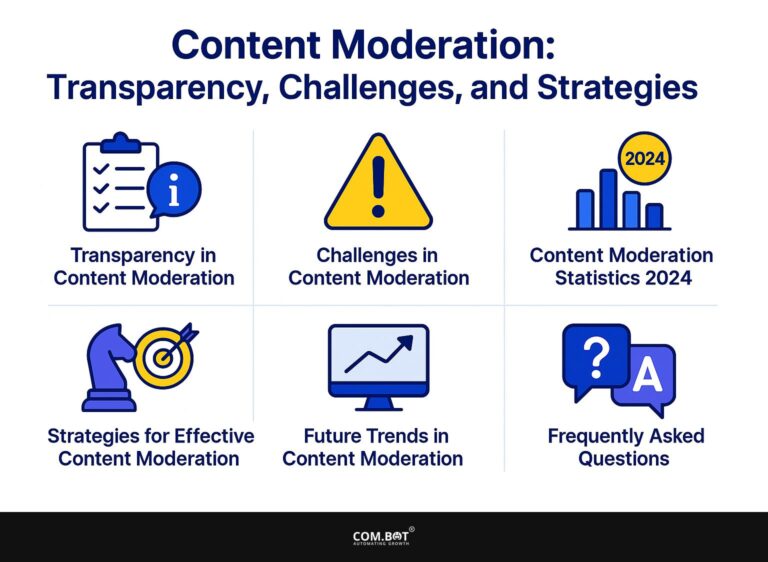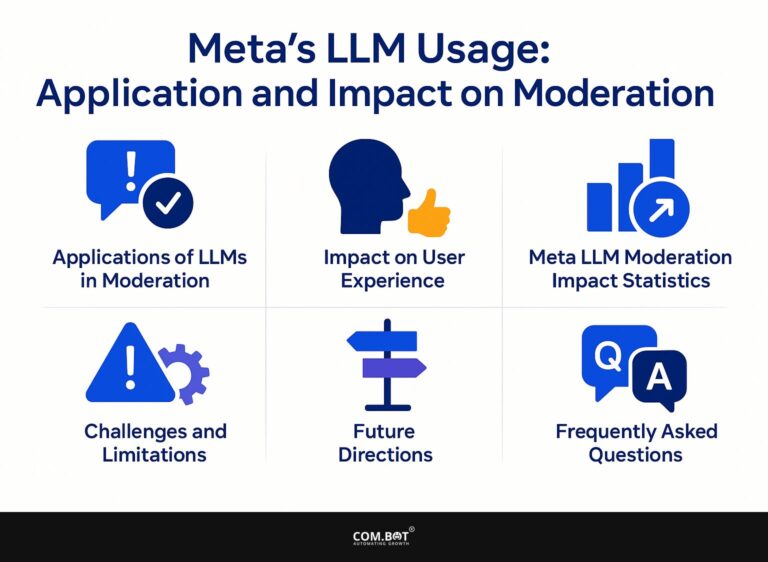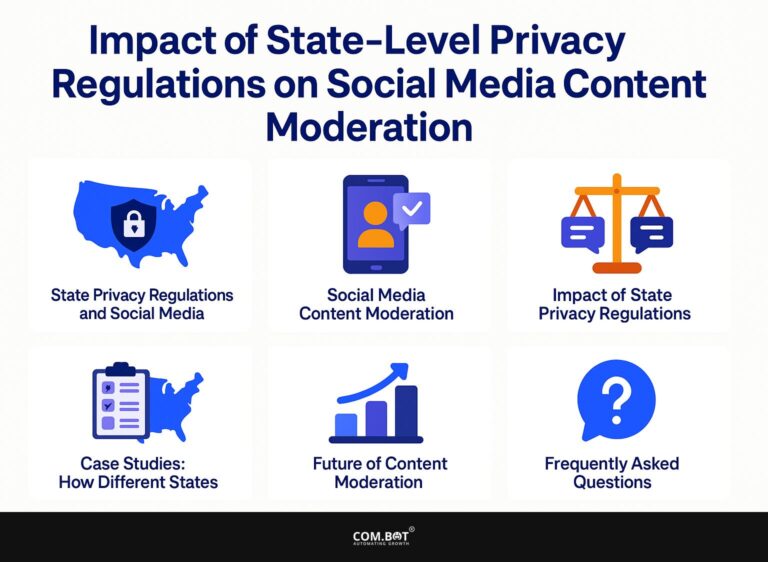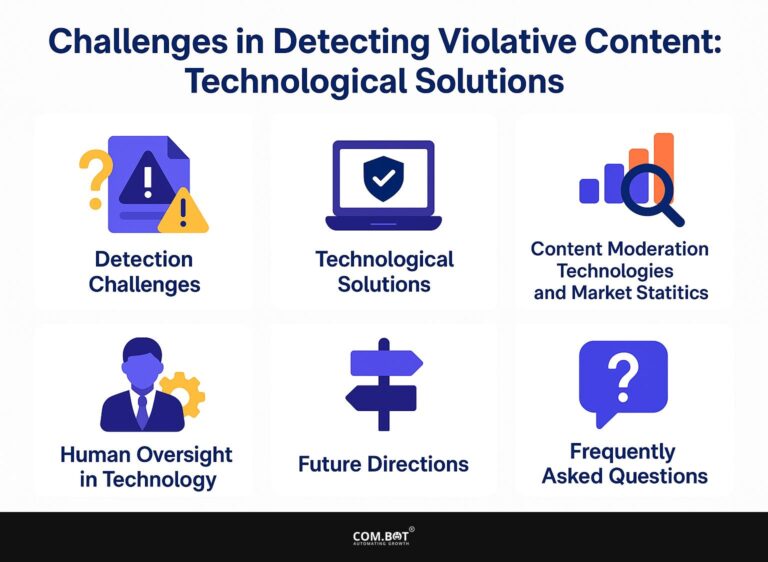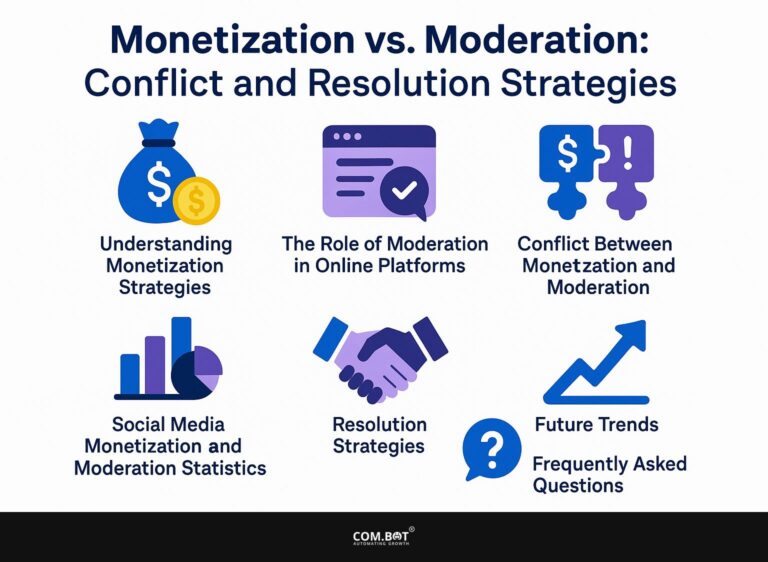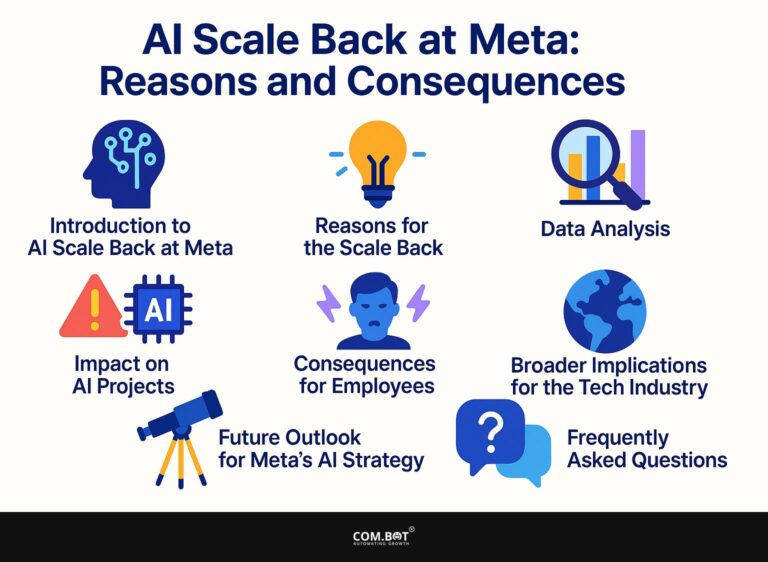Federal Content Moderation Legislation: Debate and Impact
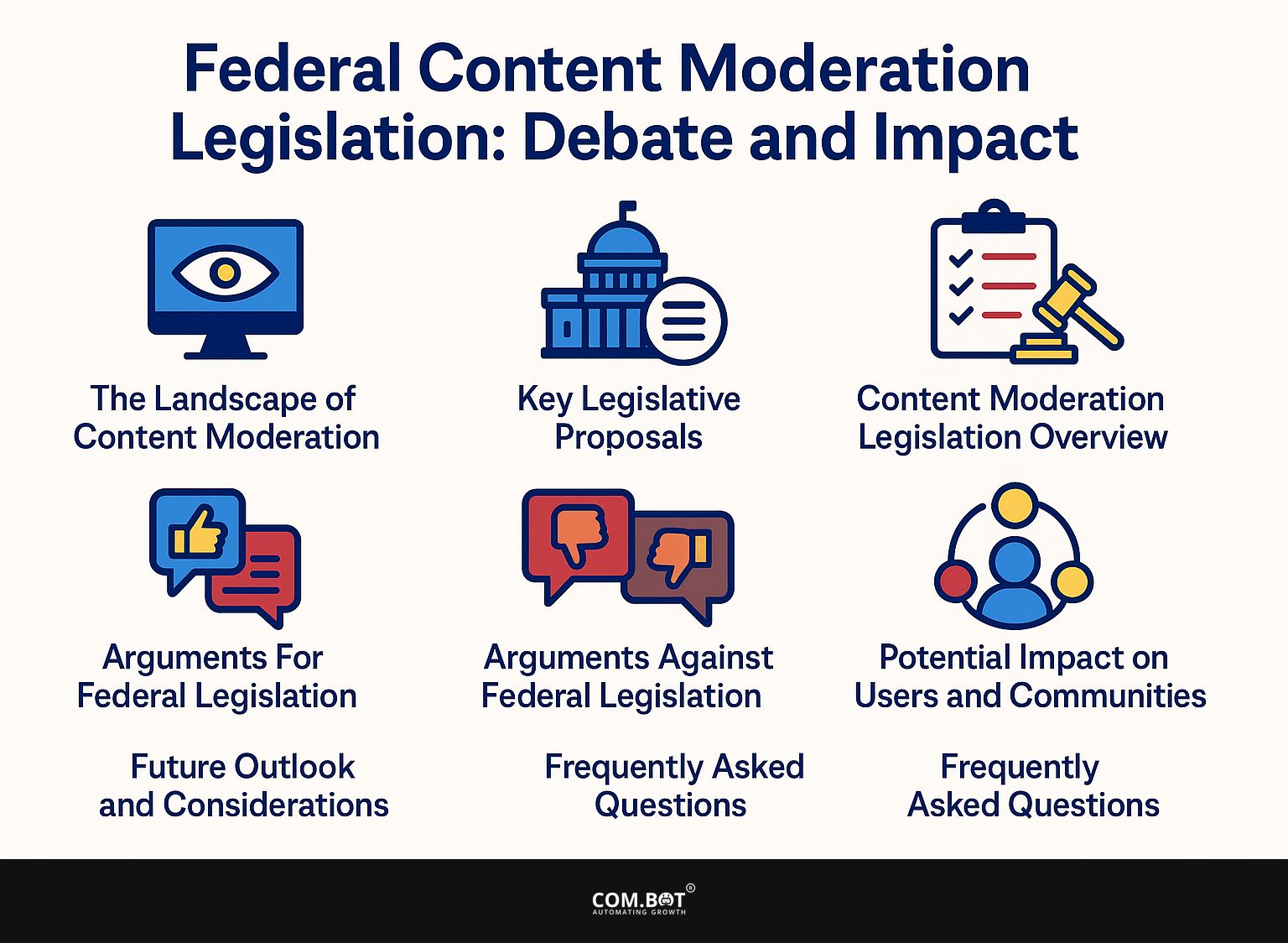
As debates heat up around federal content moderation legislation, the balance between regulatory oversight and free expression becomes critical. The Federal Trade Commission (FTC) wants to create rules for technology platforms, while people like Elon Musk argue for fewer restrictions on speech. With the Supreme Court ready to make a decision, it’s important to know what these discussions could mean.
This article examines the current situation, important legislative proposals, and the possible effects on users and society.
Key Takeaways:
- Federal content moderation legislation is a highly debated topic with potential impacts on free speech, online platforms, and tech companies.
- Key proposals for legislation include measures to hold tech companies accountable and protect free speech, but concerns over censorship and impact on innovation remain.
- The possible effects on users and online groups need careful thought, as the direction of federal laws is still unclear.
- 1 The Landscape of Content Moderation
- 2 Key Legislative Proposals
- 3 Content Moderation Legislation Overview
- 4 Arguments For Federal Legislation
- 5 Arguments Against Federal Legislation
- 6 Potential Impact on Users and Communities
- 7 Future Outlook and Considerations
- 8 Frequently Asked Questions
- 8.1 1. What is Federal Content Moderation Legislation?
- 8.2 2. Why is there a debate surrounding Federal Content Moderation Legislation?
- 8.3 3. What impact could Federal Content Moderation Legislation have on social media platforms?
- 8.4 4. How could Federal Content Moderation Legislation affect internet users?
- 8.5 5. What are some potential challenges in implementing Federal Content Moderation Legislation?
- 8.6 6. Are there any existing Federal Content Moderation Legislation laws in place?
The Landscape of Content Moderation
Knowing how content moderation works today is essential for dealing with the challenges of online discussions and interactions with users. Worth exploring: Content Moderation: User, Community, and Spend-Based Strategies
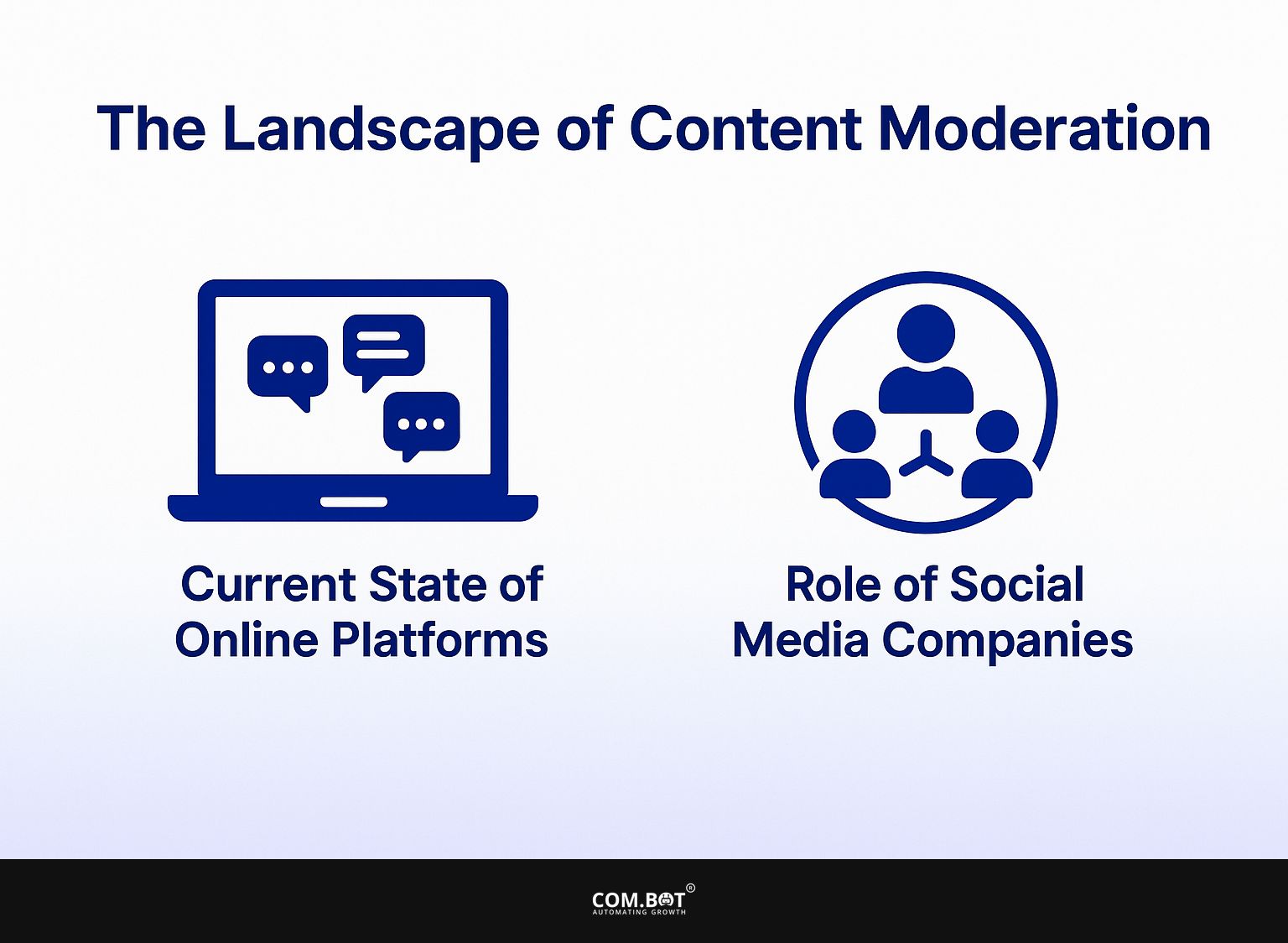
1. Current State of Online Platforms
As of 2023, major social media platforms like Meta and TikTok are heavily relying on algorithm-driven moderation to control misinformation and harmful content. These platforms use machine learning models to examine content created by users instantly.
For instance, Meta reported that 92% of content flagged for misinformation in Q2 2023 was identified by algorithms before user reports. The challenge remains in ensuring accuracy, as false positives can inhibit user expression.
To improve effectiveness, companies are using human moderators for context-sensitive evaluation, trying to balance speed and accuracy. Continuous updates to these systems show the need for regular changes to combat changing misinformation strategies.
2. Role of Social Media Companies
Social media companies act as controllers of online speech, often juggling giving users access with implementing strong moderation rules. Platforms like Twitter and Facebook enforce community guidelines through specific policies, such as hate speech restrictions and misinformation management.
For instance, Twitter employs a strike system where users receive warnings for minor offenses but face temporary or permanent suspensions for repeat violations. Facebook has implemented the `Oversight Board’ to review content decisions, ensuring a level of transparency in moderation.
Both companies regularly update their policies based on emerging issues, such as political misinformation, reflecting their ongoing challenge in promoting free speech while ensuring safe environments. Related insight: Meta AI: Role, Tools, and Limitations in Content Moderation
Key Legislative Proposals
Some key legislative proposals have been introduced, aiming to change the responsibilities of online platforms regarding content moderation and user safety (our expert opinion on state-level privacy regulations highlights their potential impact on social media practices).
1. Overview of Major Bills
Important bills, like the EARN IT Act and proposed changes to Section 230, are changing the laws for online platforms. The EARN IT Act is a proposal to make platforms responsible for hosting child exploitation content, possibly leading to heavy penalties if they do not take action.
On the other hand, suggested changes to Section 230 could remove safeguards for platforms handling specific unlawful content, causing worries about excessive control and limiting free speech.
During discussions, critics emphasize that such measures could stifle free speech and innovation, while supporters argue they are necessary for user safety. It is important for platform operators to know what these bills mean as they handle their duties.
Content Moderation Legislation Overview
Content Moderation Legislation Overview
Content Moderation Regulations Impact: User Influence and Platform Guidance
The Content Moderation Legislation Overview offers information on how rules affect social media sites and their users, especially looking at how users can affect others and what platforms must do to follow these rules. This data highlights the significant role of content moderation policies in shaping user experience and corporate responsibilities.
Content Moderation Regulations Impact reveals that 8.17% of U.S. Facebook users are directly influenced by content moderation guidelines. This figure highlights how content policies influence user interactions and the spread of information. As platforms balance freedom of expression with the need to curtail harmful content, users experience tangible impacts on their social media engagement and communication. This is particularly relevant in discussions about misinformation, hate speech, and the broader implications of digital content management.
- Platform Guidance: The data highlights a specific regulatory requirement from Germany’s NetzDG law, which mandates that illegal content must be removed within 24 hours. This forces platforms to quickly address issues, highlighting the legal demand for responsibility and quick action in managing content. Such regulations affect how platforms operate and also set examples for worldwide regulatory standards, encouraging other countries to adopt similar rules.
The Content Moderation Legislation Overview focuses on the relationship between government rules and platform guidelines. As social media keeps being important for sharing information and communication, knowing how these rules affect platforms is key to managing user experience, following laws, and handling content responsibly. When platforms follow laws, they can create safer online spaces and keep users’ trust and involvement.
2. Comparative Analysis of Approaches
Comparative analysis reveals varying approaches to content moderation legislation, ranging from strict governmental regulations to community-centric models. The EU’s Digital Services Act requires platforms to quickly delete illegal content and imposes heavy fines for failing to meet these requirements.
In contrast, California’s AB 2273 emphasizes transparency, requiring companies to disclose their moderation practices, effectively placing power in the hands of users.
Meanwhile, New Zealand’s approach supports community feedback loops, allowing users to suggest moderation strategies. These different systems show local values and have a big impact on how platforms work, influencing user confidence and participation in different regions.
Arguments For Federal Legislation
Supporters of federal laws say they are necessary to improve responsibility and openness in technology companies. This aligns with the growing impact of state-level privacy regulations on social media platforms, highlighting the importance of consistent policies.
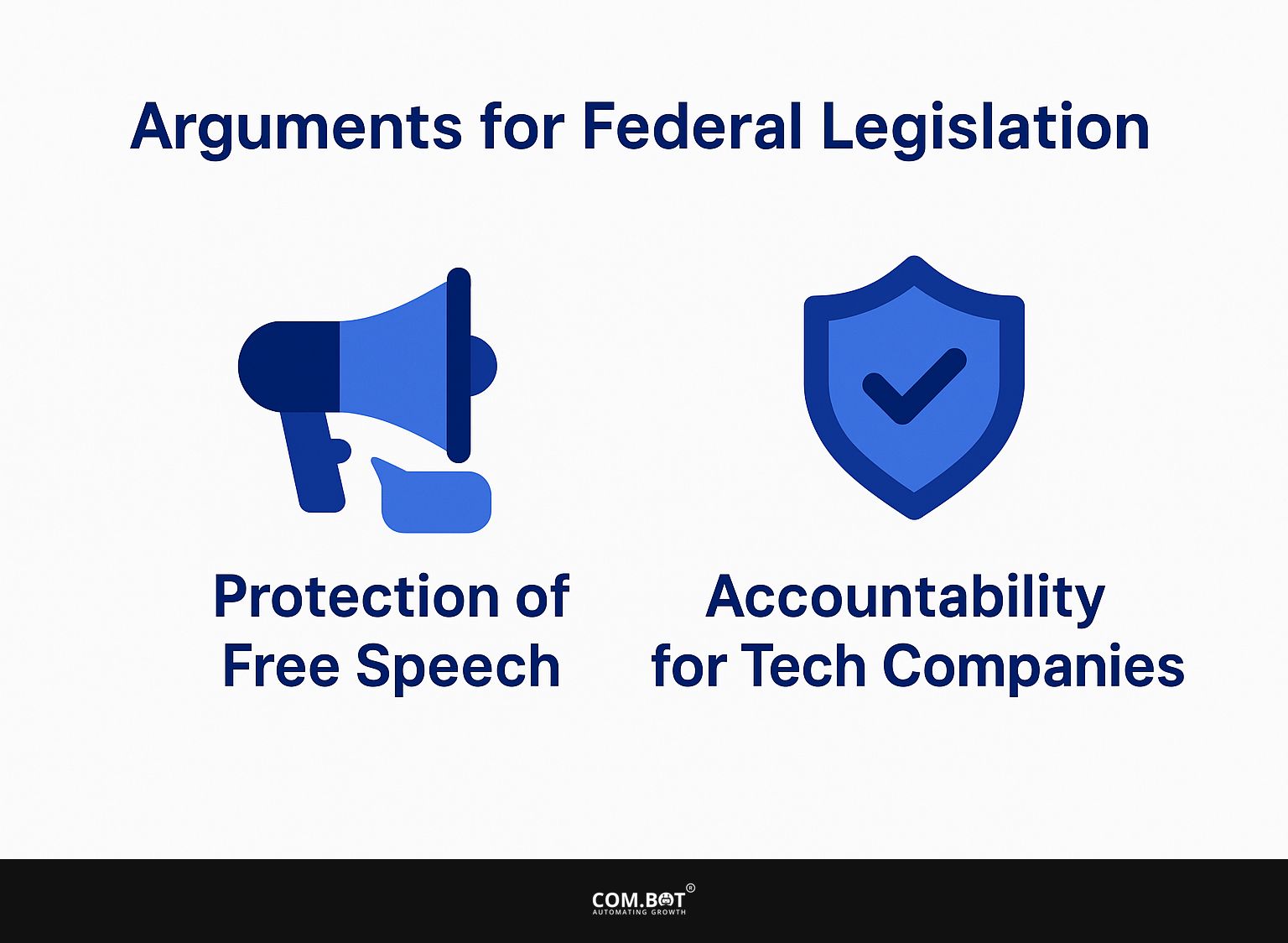
1. Protection of Free Speech
Federal legislation can serve as a safeguard for free speech, ensuring that moderation practices do not infringe upon users’ First Amendment rights.
For instance, cases like NetChoice v. Paxton highlight the tension between platform moderation and user free speech. In this instance, the court ruled that platforms must disclose moderation policies clearly to prevent claims of censorship.
Another example is Prager University v. Google, where YouTube’s content moderation practices were scrutinized. Laws can require openness in these actions, obliging platforms to explain why content is removed and giving users ways to challenge it, which might lead to a fairer method of online communication.
2. Accountability for Tech Companies
Legislators argue that imposing accountability measures on tech companies will lead to more responsible handling of harmful content. Recent fines imposed by the FTC highlight the seriousness of this issue, with penalties amounting to millions for breaches related to data privacy and false advertisements.
For instance, in 2022, the FTC fined a social media platform over $20 million for failing to protect user data adequately. Proposed regulations could further strengthen these measures, potentially mandating clearer reporting mechanisms and stricter oversight on content moderation practices.
Companies might need to use tools like transparency reports and user education programs to meet requirements, making sure they take responsibility and build trust with their users.
Arguments Against Federal Legislation
People against federal laws worry that these laws might result in too much censorship and slow down new ideas in the tech industry.
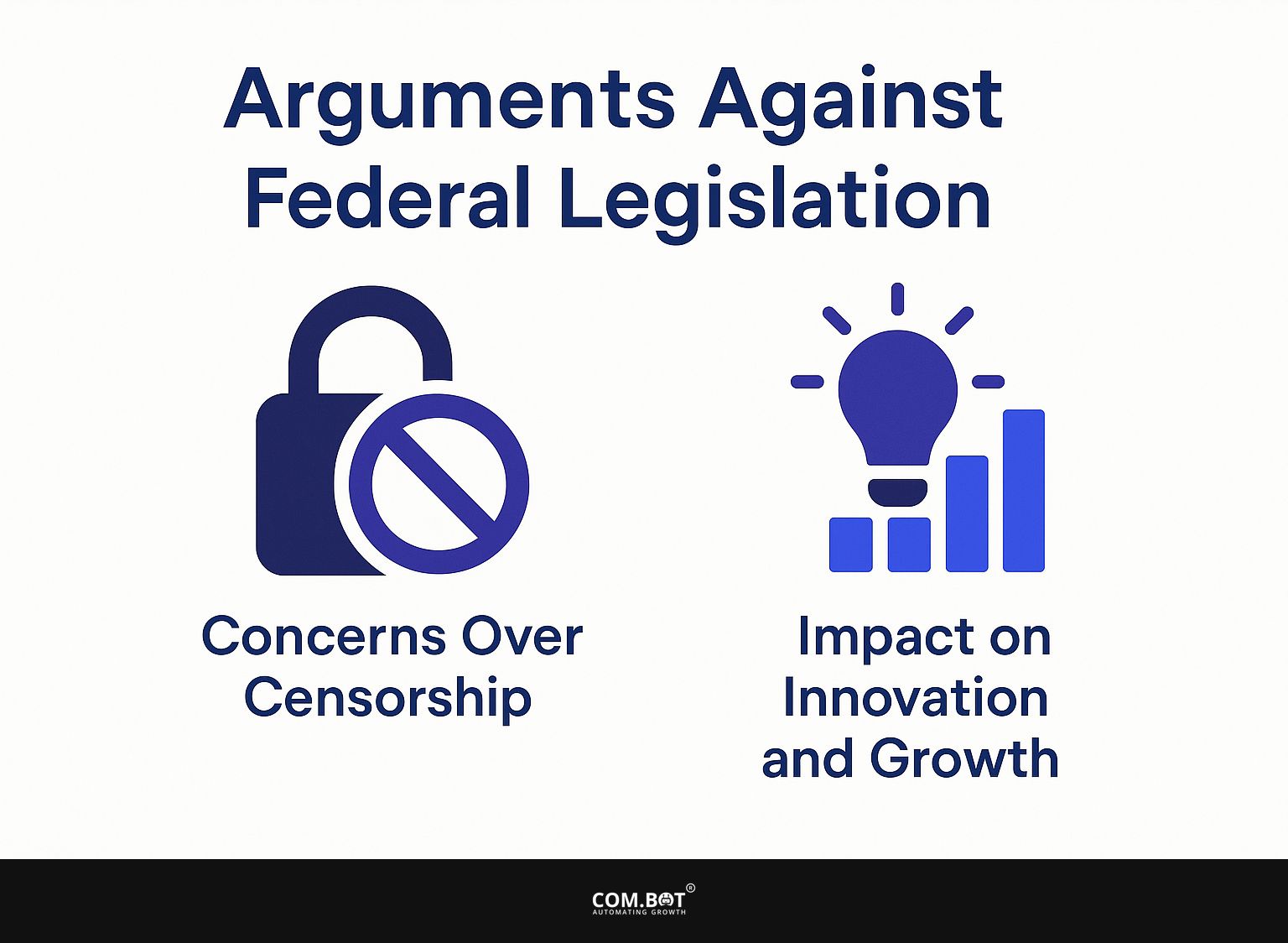
1. Concerns Over Censorship
Concerns about potential censorship arise, especially with fears of shadow-banning and restricting public discourse in the digital town square. This could manifest through regulations that limit content moderation practices, often justified as preventing misinformation.
For example, platforms may be pressured to censor posts that disagree with official narratives, leading to the suppression of dissenting voices. Current practices, such as the removal of certain social media accounts for violating vague community guidelines, illustrate these risks.
Algorithms might be tweaked to prioritize mainstream news sources, reducing visibility for independent journalism. Citizens should advocate for transparency in these content moderation policies to mitigate adverse impacts on free speech.
2. Impact on Innovation and Growth
Critics argue that stringent federal regulations could hinder innovation and growth within the technology sector. One clear example is Uber, which encountered major legal challenges when it tried to grow into different cities. These rules often required the company to change its business model, which slowed its growth compared to competitors with fewer rules.
Likewise, the tech company Google dealt with antitrust investigations that limited its advertising practices, leading to slower responses to market changes. These rules, although made with good intentions, can unintentionally slow down the innovation they are supposed to safeguard.
Companies might have to shift their resources from creating new products to meeting regulatory requirements.
Potential Impact on Users and Communities
The potential impact of federal legislation on users and communities could reshape the online experience, especially concerning user access and safety.
For example, new rules that demand stricter data privacy steps can improve user safety, allowing people to manage their personal information better. This might encourage community engagement, as users feel secure sharing their experiences online. Those curious about how these regulations play out at different levels might appreciate our analysis of state-level privacy regulations on social media.
Conversely, stringent content moderation laws could limit freedom of expression, potentially stifling diverse opinions in forums and social media. An example is the proposed regulations about misinformation; while they intend to reduce harmful content, they might accidentally cause censorship of genuine discussions, which could significantly impact how communities interact.
Future Outlook and Considerations
Upcoming laws about content moderation raise many issues, including national security and the legal effects of these proposed laws. Stakeholders must evaluate the impact of potential regulations on free speech, user privacy, and the responsibility of platforms.
For example, proposed laws might require platforms to use better filtering systems. This might involve using tools like AI moderation software, such as Amazon Comprehend or Google Perspective API, to detect harmful content.
Simultaneously, platforms could face tougher penalties for non-compliance, urging them to invest in proactive measures. As talks continue, there might be a move towards worldwide unified rules, urging nations to work together on these important topics.
Frequently Asked Questions
1. What is Federal Content Moderation Legislation?
Federal Content Moderation Legislation includes laws made or suggested by the federal government to control online content on social media and other internet platforms. It addresses problems like hate speech, false information, and privacy issues.
2. Why is there a debate surrounding Federal Content Moderation Legislation?
The debate surrounding Federal Content Moderation Legislation centers around the balance between protecting free speech and regulating harmful or false content online. Some argue that government intervention could limit free speech, while others believe it is necessary to prevent the spread of harmful content.
Federal Content Moderation Legislation could have a significant impact on social media platforms, as they would be required to follow stricter guidelines and potentially face penalties for not complying. It could also lead to changes in their algorithms and content moderation processes.
4. How could Federal Content Moderation Legislation affect internet users?
If enacted, Federal Content Moderation Legislation could affect internet users by potentially limiting their ability to freely express themselves online. It could also lead to changes in the type of content that is available on social media platforms and other digital platforms.
5. What are some potential challenges in implementing Federal Content Moderation Legislation?
Some potential challenges in implementing Federal Content Moderation Legislation include determining what content should be regulated and who is responsible for enforcing the regulations. There may also be concerns about government overreach and the impact on free speech.
6. Are there any existing Federal Content Moderation Legislation laws in place?
Currently, there is no federal law specifically addressing content moderation online. However, there are current laws, like the Communications Decency Act and the First Amendment, that are used to control online content. A number of new bills have been introduced, but none have become law yet.
